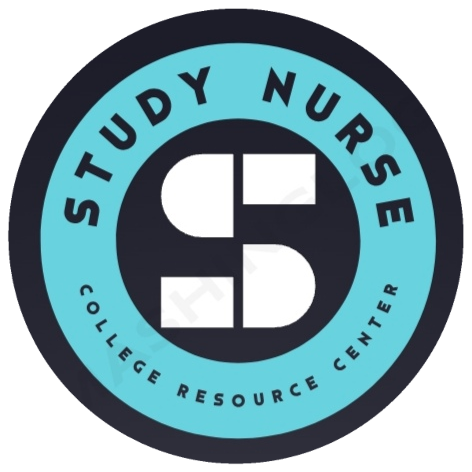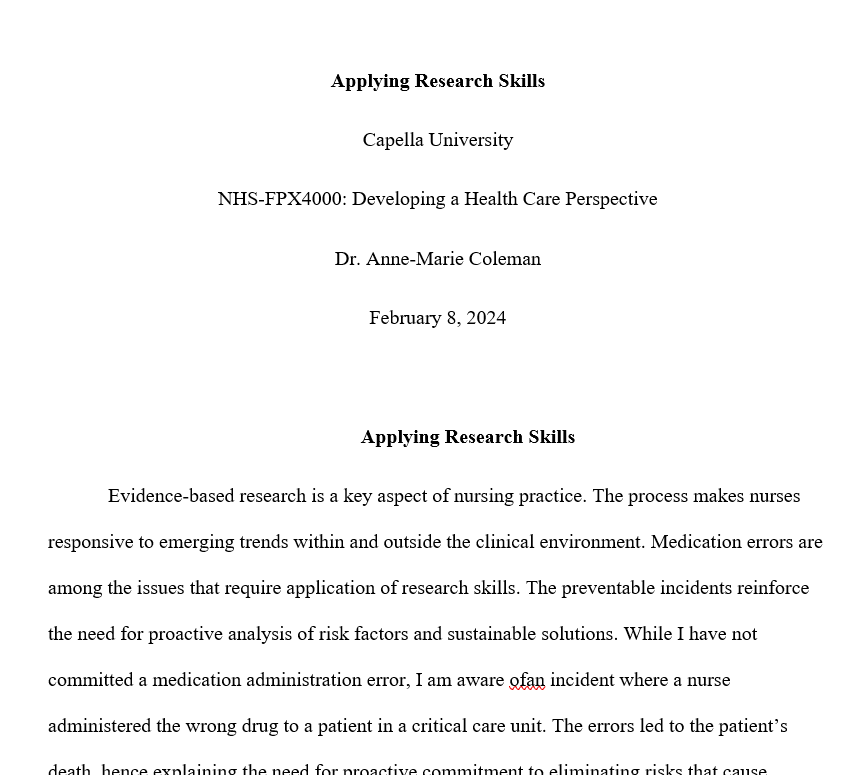Capella University
NHS-FPX4000: Developing a Health Care Perspective
Dr. Anne-Marie Coleman
February 8, 2024
Applying Research Skills
Evidence-based research is a key aspect of nursing practice. The process makes nurses responsive to emerging trends within and outside the clinical environment. Medication errors are among the issues that require application of research skills. The preventable incidents reinforce the need for proactive analysis of risk factors and sustainable solutions. While I have not committed a medication administration error, I am aware ofan incident where a nurse administered the wrong drug to a patient in a critical care unit. The errors led to the patient’s death, hence explaining the need for proactive commitment to eliminating risks that cause adverse drug reactions, severe health complications, and premature deaths. A criminal lawsuit against the nurse for negligence showed the extent of damages caused my medication administration errors.
Identifying Sources
I focused on identifying peer-reviewed journal articles from the high-impact PubMed database. I accessed scholarly articles using keywords such as medication administration, medication errors, and medication safety. An advanced search enabled me to narrow the sources to ones published within the last three years. On credibility of the articles, one criterion was acquiring current articles published within the last three years. I also checked the authors’ credentials to ascertain knowledge and experience in addressing issues within the clinical environment. I also ensured that the purpose of the articles addressed medication errors within a nursing unit.
Annotated Bibliography
Alghamdi, A., Keers, R., Sutherland, A., & Ashcroft, A. (2019). Prevalence and nature of medication errors and preventable adverse drug events in pediatric and neonatal intensive care settings: A systematic review. Drug Safety, 42, 1423-1436. https://link.springer.com/content/pdf/10.1007/s40264-019-00856-9.pdf
Alghamdi et al. acknowledged the adverse impact of medication errors such as prolonged hospitalization, readmissions, and additional costs of care. The preventable incidents are common in critical care settings, where nurses experience burnout, distractions, and pressure of handling patients with complex health needs. The authors emphasized the need to understand the burden of medication errors and optimize safety policies and procedures across an organization. The article is useful to nurse researchers seeking to identify competencies that promote accurate and safe medication preparation and administration. The findings highlight the importance of competencies in calculating dosages, interpreting warnings, and using appropriate formulations to avoid harmful events.
Alrabadi, N., Shawagfeh, S., Haddad, R., Mukattash, T., Abuhammad, S., Al-rabadi, D., Farha, R., AlRabadi, S., & Al-Faouri, I. (2021). Medication errors: A focus on nursing practice. Journal of Pharmaceutical Health Services Research, 12, 78-85. https://www.researchgate.net/publication/348162680_Medication_errors_a_focus_on_nursing_practice
The authors highlighted events in nursing practices associated with medication errors. The findings indicated that timely, accurate, and complete reporting is a priority that help prevent medication errors. In this case, organizations should consider standardizing guidelines such as education and training, communication, and labelling to enhance quality and safety of patient care. Further, the findings identify proper labelling, reduced workload, reduced distractions, and a blame-free culture as interventions that help improve medication administration safety. The article is useful to nurse researchers aiming to address the various causes of medication errors. The article also enhances awareness about the importance of error reporting in enabling the healthcare team to initiate timely interventions and learn from mistakes.
D’Errico, S., Zanon, M., Radaelli, D., Padovano, M., Santurro, A., Scopetti, M., & Frati, P. (2022). Medication errors in pediatrics: Proposals to improve the quality and safety of care through clinical risk management. Frontiers in Medicine, 8, 1-6. https://www.frontiersin.org/articles/10.3389/fmed.2021.814100/full
D’Errico et al. recognized medication errors as one of the most common issues in nursing. The authors encouraged healthcare providers to adopt a comprehensive framework for addressing medication errors. The approach entails monitoring transcription, dispensing, dosage, and administration. The authors’ focus on pediatric unit highlights the adverse effects of errors and the need to timely interventions to reduce their frequency. The article is useful to researchers focused on addressing issues within complex clinical environments such as a critical care unit that undermine quality and safety of patient care. The findings remind healthcare providers about the value of a prevention-based culture to enhance staff commitment towards maintaining an error-free nursing practice.
Khan, A., & Tidman, M. (2022). Causes of medication error in nursing. Journal of Medical Research and Health Sciences, 5(1), 1753-1764. https://doi.org/10.52845/JMRHS/2022-5-1-7
Khan and Tidman emphasized the need for healthcare providers to prioritize medication administration safety. The authors also reminds healthcare professionals about the duty of care, including collaborating to identify and intercept risks. The findings also address the importance of a learning and interdisciplinary collaboration in promoting high quality and safe care. Further, the study emphasized the need for transformational leadership to remind nurses about a shared purpose and the need for individual and collective commitment to maintaining a safe working environment. The findings allows nurse researchers to understand the damage caused by medication errors and alternative interventions for avoiding such issues across the care continuum.
Lessons Learnt
The research experience was a milestone in my academic and professional journey. The process enhanced awareness about evidence-based and scholarly articles appropriate for nursing research. The tasks also increased knowledge about the different types of medication errors, consequences, and interventions necessary to enhance quality and safety of patient care. This annotated bibliography will enable me to advance research skills and contribute towards helping my organization address common health problems.
References
Alghamdi, A., Keers, R., Sutherland, A., & Ashcroft, A. (2019). Prevalence and nature of medication errors and preventable adverse drug events in pediatric and neonatal intensive care settings: A systematic review. Drug Safety, 42, 1423-1436. https://link.springer.com/content/pdf/10.1007/s40264-019-00856-9.pdf
Alrabadi, N., Shawagfeh, S., Haddad, R., Mukattash, T., Abuhammad, S., Al-rabadi, D., Farha, R., AlRabadi, S., & Al-Faouri, I. (2021). Medication errors: A focus on nursing practice. Journal of Pharmaceutical Health Services Research, 12, 78-85.
D’Errico, S., Zanon, M., Radaelli, D., Padovano, M., Santurro, A., Scopetti, M., & Frati, P. (2022). Medication errors in pediatrics: Proposals to improve the quality and safety of care through clinical risk management. Frontiers in Medicine, 8, 1-6. https://www.frontiersin.org/articles/10.3389/fmed.2021.814100/full
Khan, A., & Tidman, M. (2022). Causes of medication error in nursing. Journal of Medical Research and Health Sciences, 5(1), 1753-1764. https://doi.org/10.52845/JMRHS/2022-5-1-7

